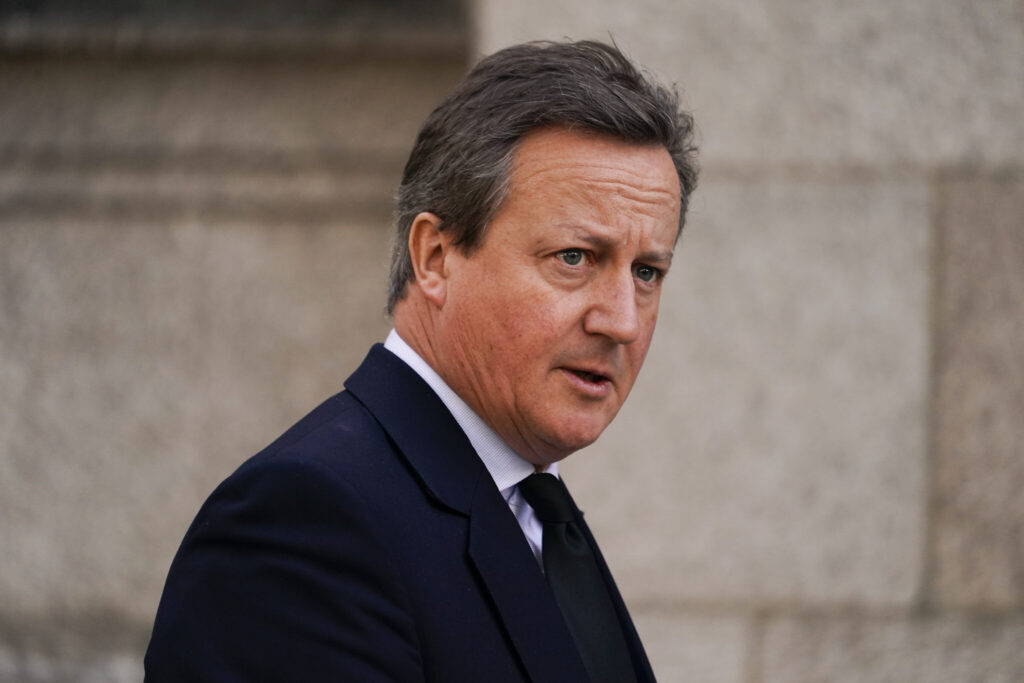
David Cameron’s appointment as Foreign Secretary and his elevation to the House of Lords will be a comfort to failed politicians everywhere. Lord Cameron, as he is now known, resigned as Prime Minister in 2016 following the referendum he called in a failed attempt to settle a long-running dispute in his party as to whether or not Britain should remain part of the European Union.
British voters decided by a narrow margin of 52%-48% to leave the EU, and Cameron, who had supported the campaign to remain, resigned as soon as the result was known. Rather than cement public opinion, the decision to leave is now blamed as a key reason for Britain’s persistently low growth rate and continues to cause ructions among Britain’s Conservatives.
Cameron’s departure saw a series of successors come and go; Theresa May would be ousted by Boris Johnson, who in turn would be replaced briefly by the near-disastrous brief tenure of Liz Truss who in turn was replaced by the incumbent Rishi Sunak 12 months ago.
The referendum, designed to bring harmony within the Conservative Party has done anything but, and remains a divisive political issue. Neither it, nor the Labour party which remains some 20 points ahead in opinion polls, ahead of an election next year, is ready to take steps to undo Brexit despite it being blamed for a range of mounting social ills as well as the limitations it places on citizens ability to travel unencumbered on the European continent.
“I used to be the future once,” he quipped in his farewell speech outside 10 Downing Street as he left office. That has gone full circle, and his appointment this week puts him back at the heart of the British political establishment. Arch-rival Boris Johnson has resigned his parliamentary seat, but continues to actively comment on political life, seeking to remain relevant, while May is on the party back benches in the House of Commons and Truss still has a following on the far right of the party. It was Theresa May who shocked the party faithful at its annual conference in 2002 when she said the Conservatives were at risk of becoming labelled the “nasty party” a label which has stuck as the party has shifted increasingly to the right.
Cameron remains a popular centrist in a fractured Conservative Party and his appointment is seen as an attempt by Sunak to make the party more likeable and electable. The appointment of Cameron will add gravitas to a cabinet described by many commentators as lightweight as Sunak tries to make a comeback of his own. It may however be too little too late.
Cameron, the former TV company PR executive whose carefully engineered meteoric rise to power saw him become the youngest Prime Minister in 200 years when he led the country’s first coalition government since World War Two in 2010. His government introduced unpopular austerity measures and the cutbacks have contributed strongly to a “Broken Britain” rhetoric which is playing strongly into the hands of the Labour Party which is planning on tightening the screws on the country’s privileged financial elite should it, as it appears likely to do, win the next election.
As Foreign Secretary, Cameron takes over one of the most important jobs in government amidst one of the most fraught periods of recent times with war raging in Ukraine following Russia’s invasion nearly two years ago and more recently the war between Israel and Hammas in Gaza. As Prime Minister, Cameron was not averse to taking risks. He oversaw Britain instrumental in the overthrow of Libyan dictator Moammar Ghaddafi, and in 2014, he agreed to allow a referendum on Scottish independence and campaigned against secession. The Scots voted 55% – 45% to remain part of the United Kingdom. That may have emboldened him as pressure grew for what became Brexit, but that turned into a gamble-too-far and cost him his job.
When I introduced him at a big investment conference shortly after his ouster, I said something like this: “Former British Prime Minister David Cameron should have known better than to allow British voters a say on the country’s future in Europe. It came just weeks after a vote on the naming of a multi-million-pound polar research vessel had to be overturned. Apparently the public choice of Boaty McBoatface was not deemed appropriate, and the vessel was named Sir David Attenborough instead.”
“Very droll,” he muttered quietly as he made his way across the stage and ignored the comment completely and in minutes 4000 people were eating out of his hand.
Dave’s back.



